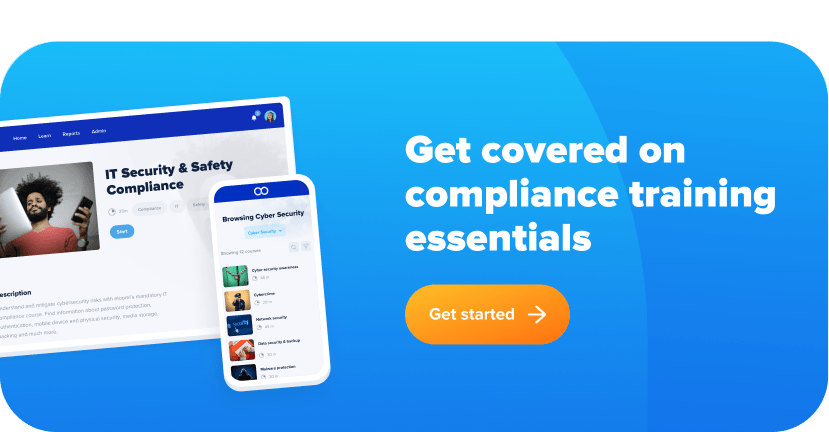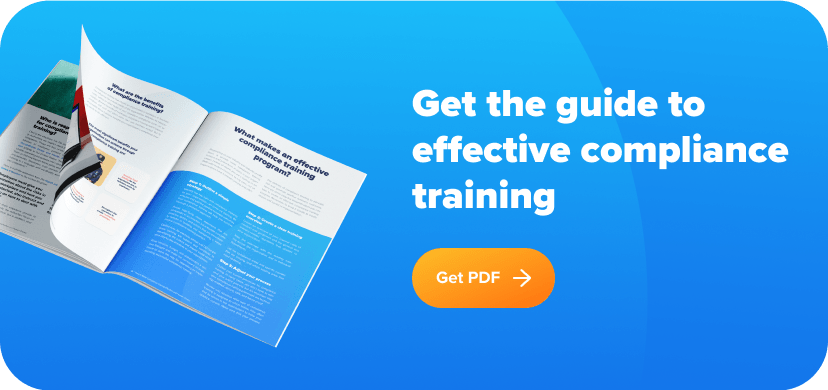Why it matters: Without proper compliance training, your company could violate key New York state and New York City employment laws, facing harsh penalties and lawsuits.
These topics can get dense and confusing. We’ll keep it brief and tell you exactly what you need to know to stay on top of compliance across the US. For more information, check out our trainings on each of these topics, which dive deep into the details of each law, and how your company stays compliant.

New York Sexual Harassment Training
New York compliance requirements mean employers with or more employees in the state to give sexual harassment training for all employees at least once per year. Luckily, the state has created its own training program that will satisfy the state requirement.
Besides the state requirements, New York City has implemented additional compliance training requirements. New York City employers must keep a record of each employee’s training for at least three years. The best way to satisfy this requirement is to have employees sign an acknowledgment form stating that they attended your company’s training program.
If an employer uses its own sexual harassment prevention training program, it must cover the following topics:
- Define sexual harassment under New York City, New York state, and federal law
- Examples of workplace sexual harassment
- A description of the internal complaint process
- A description of the complaint process available through the state commission, New York State Division of Human Rights, and the United States Equal Employment Opportunity Commission
- A discussion on the prohibition of retaliation against an employee making a complaint
- Information about bystander intervention that includes resources explaining how to engage
- Responsibilities of supervisors in the prevention of sexual harassment and retaliation

New York Minimum Wage
The state minimum wage is $14.20 per hour, effective January 1, 2023. On January 1, 2024, it will hit $15.00 per hour. For tipped employees in the service industry, the current minimum wage is $12.50 per hour and for tipped employees in the food service industry, the minimum wage is $10.00 per hour. However, both minimum wage rates must still meet the state minimum wage and, if not, the employer must make up the difference.
In New York City, the minimum wage is higher than the state minimum wage. The current minimum wage for all employers in New York City is $15.00. This minimum wage applies to tipped workers so if your employees don’t make minimum wage after calculating their tips, then your business must make up the difference.
New York Salary History Ban & Wage Transparency
New York compliance law prohibits employers from asking applicants and employees about their prior salary. The law also prohibits employers from asking an applicant or employee’s former employer about the worker’s past wages. Employers may not use the worker’s previous wages, if known, to set their current salary.
New York City also has a wage transparency law, requiring most employers to disclose salary ranges in their job postings. The law took effect November 1, 2022 and requires employers with four or more employees to post wage range that it believes in good faith the company would pay for the role. This applies to any new job, promotion, or internal transfer that will be performed in part in New York City.

New York Paid Family Leave
New York enacted paid leave in 2016. Since then, the law has been strengthened several times, now expanding covered time off to care for siblings.
New York compliance with Paid Family Leave provides job protected paid time off to employees:
- Who recently adopted, fostered, or birthed a baby
- To care for a family member with a serious health condition
- To assist loves ones when a spouse, domestic partner, child, or parent is deployed abroad on active military service
Employees taking leave under this law will be entitled to up to 12 weeks of paid leave. The employee’s pay will be up to 67 percent of the average weekly wage, up to a maximum of $1131.08 for 2023. This maximum amount may be updated each year.

New York Paid Sick Leave
Different from paid family leave, New York state has Paid Sick and Safe Leave. Employers must provide workers with at least 40 hours of paid sick leave, unless the employer has a net income of $1 million or less in the previous tax year and less than five employees. If an employer meets those requirements, then the sick leave may be unpaid.
Sick leave can be used for any of the following reasons:
- An employee or employee’s family member’s mental or physical illness, injury, or health condition
- The diagnosis, care, or treatment of a mental or physical illness, injury, or health condition of the employee or employee’s family member
- The need for a medical diagnosis or preventative care for the employee or an employee’s family member
- To receive services from a domestic violence shelter, rape center, or similar service
- To participate in safety planning, relocate, or any other precaution for the safety of the employee or their family
- To meet with an attorney or other social services provider
- To file a complaint or domestic incident report
- To enroll children in school
- To take any other necessary action to ensure the health and safety of their family or themself
New York City has its own paid sick leave law. If an employer has fewer than five employees and less than $1 million in net income in the previous tax year, they may provide unpaid sick leave. All other employers must provide paid sick leave of at least 40 hours per year.
Employers must provide:
- A written notice of employee rights in English and the employee’s primary language
- A notice in a conspicuous place in the workplace
- Provide a written sick leave policy to each employee at the start of their employment
- The employee’s total sick leave balance for each pay period
- The amount of sick leave the employee used and accrued during each pay period

Ban the Box and Fair Chance
New York state does not have a ban the box law. However, expect that to change soon. New York City does have such a law in effect, called the Fair Chance Act.
This law prohibits employers in New York City from asking about an applicant’s prior criminal convictions until after an offer of employment has been made. If an employer wants to revoke an offer of employment based on the results of a criminal background check, they must balance numerous factors.
These factors include:
- The policy of New York City to overcome stigma toward exclusion from employment for people with criminal histories
- Whether the person was under age 25 at the time of the arrest or incident
- The seriousness of the offense
- The legitimate business interest of the employer in protecting property, safety, and welfare of other employees and the public
Electronic Monitoring in the Workplace
Under New York compliance law, employers must provide notice to an employee upon hire if the employer monitors phone calls, emails, or internet usage. The notice must be in writing and sent by mail, provided in person, or by email and employees must acknowledge receipt in writing by the same method.

Breastfeeding Accommodations
Employers must provide reasonable unpaid breaks for new mothers to express breast milk for up to three years after childbirth. Employees may use paid break time if available. Employers must also provide these employees with a private room, other than a bathroom, where they can express breast milk without interruption.
Employers in New York City with at least four employees must provide specific lactation rooms that include a refrigerator to store milk. Covered employers must also have a lactation room accommodation policy.
Labor Law Poster Requirements
New York makes it easy for employers to follow all labor law poster requirements. The New York Department of Labor gives a list of all state and federal labor posters that employers need to provide to employees. Remember, these must be posted in a conspicuous place in the work location, or provided by an acceptable electronic means.

Medical & Recreational Marijuana
Recreational marijuana is now legal in New York. Medical marijuana use has been legal for many years and patients receive job protections.
New York’s Compassionate Care Act classifies medical marijuana patients as having a disability for purposes of job protections. Registered patients may not have adverse employment actions taken against them based on their health condition or their use of medical marijuana.
Key Takeaways for New York Compliance Training
- Sexual harassment training is required for all employees in New York once per year, with additional requirements from NYC employers
- The current minimum wage in New York is $14.20 per hour, with plans to raise it to $15 per hour in 2024. In NYC, the minimum wage is already $15 per hour.
- It is illegal for employers to ask about an applicant or employee’s salary history. There are also wage transparency requirements for job postings.
- Employees taking leave under New York paid family leave law may be entitled to up 12 weeks of paid leave, with 67% of their average weekly wage being covered (up to a maximum set amount)

Your Next Steps
It’s important to stay compliant with New York employment laws, and that means making sure your HR teams are properly trained on the ever-changing regulations with robust compliance training. You don’t want to be caught off guard and end up facing a lawsuit.
To help you, partner with an employee training platform that does the hard work for you, so you can focus on your core business needs. With eloomi, we make sure your compliance training is up to date and contains accurate information to help guide and support your employees in their work.
Get started with ready-made compliance content. Book your demo today.





